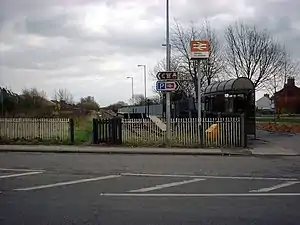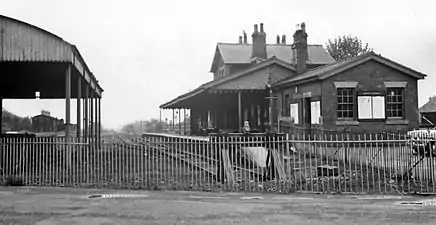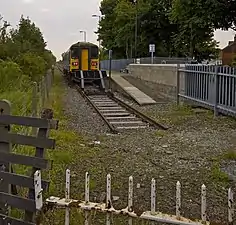Barton-on-Humber railway station
Barton-on-Humber railway station serves the town of Barton-upon-Humber in North Lincolnshire, England.
 | |
| Location | Barton-upon-Humber, North Lincolnshire England |
| Coordinates | 53.689°N 0.443°W |
| Grid reference | TA029225 |
| Managed by | Northern Trains |
| Platforms | 1 |
| Other information | |
| Station code | BAU |
| Classification | DfT category F1 |
| History | |
| Opened | 1 March 1849 |
| Passengers | |
| 2015/16 | |
| 2016/17 | |
| 2017/18 | |
| 2018/19 | |
| 2019/20 | |
| Notes | |
Passenger statistics from the Office of Rail and Road | |
Passenger lines of North East Lincolnshire | ||||||||||||||||||||||||||||||||||||||||||||||||||||||||||||||||||||||||||||||||||||||||||||||||||||||||||||||||||||||||||||||||||||||||||||||||||||||||||||||||||||||||||||||||||||||||||||||||||||||||||||||||||||||||||||||||||||||||||||||||||||||||||||||||||||||||||||||||||||||||||||||||||||||||||||||||||||||||||||||
|---|---|---|---|---|---|---|---|---|---|---|---|---|---|---|---|---|---|---|---|---|---|---|---|---|---|---|---|---|---|---|---|---|---|---|---|---|---|---|---|---|---|---|---|---|---|---|---|---|---|---|---|---|---|---|---|---|---|---|---|---|---|---|---|---|---|---|---|---|---|---|---|---|---|---|---|---|---|---|---|---|---|---|---|---|---|---|---|---|---|---|---|---|---|---|---|---|---|---|---|---|---|---|---|---|---|---|---|---|---|---|---|---|---|---|---|---|---|---|---|---|---|---|---|---|---|---|---|---|---|---|---|---|---|---|---|---|---|---|---|---|---|---|---|---|---|---|---|---|---|---|---|---|---|---|---|---|---|---|---|---|---|---|---|---|---|---|---|---|---|---|---|---|---|---|---|---|---|---|---|---|---|---|---|---|---|---|---|---|---|---|---|---|---|---|---|---|---|---|---|---|---|---|---|---|---|---|---|---|---|---|---|---|---|---|---|---|---|---|---|---|---|---|---|---|---|---|---|---|---|---|---|---|---|---|---|---|---|---|---|---|---|---|---|---|---|---|---|---|---|---|---|---|---|---|---|---|---|---|---|---|---|---|---|---|---|---|---|---|---|---|---|---|---|---|---|---|---|---|---|---|---|---|---|---|---|---|---|---|---|---|---|---|---|---|---|---|---|---|---|---|---|---|---|---|---|---|---|---|---|---|---|---|---|---|---|---|---|---|
| ||||||||||||||||||||||||||||||||||||||||||||||||||||||||||||||||||||||||||||||||||||||||||||||||||||||||||||||||||||||||||||||||||||||||||||||||||||||||||||||||||||||||||||||||||||||||||||||||||||||||||||||||||||||||||||||||||||||||||||||||||||||||||||||||||||||||||||||||||||||||||||||||||||||||||||||||||||||||||||||
The station, which was once the terminus of a 3 1⁄4-mile (5 km) branch line from New Holland, is these days the terminus of the Barton line services operating from Cleethorpes. It is situated 22 3⁄4 miles (37 km) west of the resort. There is a connecting Stagecoach in Hull bus service from the town to Hull across the Humber Bridge which was introduced on the opening of the bridge to replace the New Holland Ferry.
Approach to the branch was by a triangular junction at New Holland which enabled passenger trains to operate a New Holland Pier to Barton service in connection with the ferries and rail services from Cleethorpes and for freight to have direct access from the main line via Ulceby Junction. When the Humber Bridge opened the junction was removed and passenger services operated directly from Cleethorpes via the new platform at New Holland.
History
The station was opened as part of the branch line from New Holland to Barton-on-Humber in 1849.[1] It was planned that the railway would extend westwards from Barton to Winterton and beyond, though this never happened.[2] In the early years of the 20th century, plans were published, authorised in Parliament, and land bought and marked out on the ground, for the Barton Branch to link up with the North Lindsey Light Railway, at Winteringham. Initially, the plans were that the branch would join the Barton Branch via the coalyard, but this was later changed to an end on join to the 'main' line at Barton. People who owned property that would need to be demolished for this purpose were warned. Though the First World War was used as a reason to delay the extension, it was anticipated that post 1919, it would go ahead. A diversion of the A1077 was authorised for South Ferriby, and a crossing of Sluice Lane in Winteringham. Further pleas from Lindsey County Council, and the local MP were made to get the line built, including the reason of getting work for men to do in the 1920s. Even after the passenger service was withdrawn on the NLLR in 1925, the proposals were retained, and it was not until 1934 that plans to connect the Barton Branch and the NLLR were finally abandoned officially. At the same time as the proposal for a line from Winteringham to Barton was proposed, Immingham Docks was being built (started 1906, opened 1912). We can see the rationality of such a line for direct freight in to Immingham Docks - there was even talk of doubling the track on the Barton Branch, and a proposal for a new line direct from Barton to Goxhill so that the Goxhill - Immingham Docks Branch could serve the docks directly from Scunthorpe and Barton! Barton station was considerably larger until the early 1970s, but the old goods yard & buildings were all demolished by British Rail in 1973. The nearby bus station was added in 1981 when the Humber Bridge opened, whilst the station platform now in use was rebuilt to current specifications in 1998.
 The station in 1967
The station in 1967 The station in May 1976
The station in May 1976 The station in 2008, looking east
The station in 2008, looking east.jpg.webp) The station in 2012, looking west
The station in 2012, looking west
Facilities
The station is unstaffed and has only basic amenities (waiting shelter, bench seating, bike rack and timetable poster board). Tickets have to be bought in advance or from the conductor on board the train. Step-free access is available from the entrance to the platform via ramp.[3]
Service
Monday to Saturdays there is generally a two-hourly service from Barton-on-Humber to Grimsby Town and Cleethorpes.[4] There are four arrivals & departures on summer Sundays also. The service is now worked by a Class 153 all day - the practice of using a Class 185 unit on the first service to Cleethorpes (which only used the doors on middle carriage of the three car unit due to it being longer than the platforms at many of the intermediate stations) ended at the December 2013 timetable change. However, since June 2018, this practice has been restarted.
Freight services do not operate over the route aside from the occasional engineering train. A restriction now prevents mainline locomotives from entering the station. General goods facilities were withdrawn and the old goods yard closed back in the late 1960s, though the now-closed Albright and Wilson chemical works a mile or so to the east had a rail connection up until closure in 1988.[5] This received regular trainloads of phosphoric acid from the company's plant in Cumbria until the early 1980s.[6]
References
- "Subterranea Britannica - NEW HOLLAND PIER STATION". Archived from the original on 22 February 2009. Retrieved 25 March 2009.
- Osgerby, Trevor (6 April 2010). "Barton and Beyond". The Historian. The Historian. p. 3. Archived from the original on 26 November 2015. Retrieved 25 November 2015.
- Barton-on-Humber station facilities National Rail Enquiries; Retrieved 23 January 2017
- Northern Rail Timetable 31 - Barton-on-Humber to CleethorpesNorthern Rail; Retrieved 13 January 2020
- Attractions and points of interest along the Barton lineFriends of the Barton Line; Retrieved 6 December 2013
- "Freight operations on the Barton on Humber line"Lincolnshire Rail Gallery; Retrieved 5 May 2016
External links
- Train times and station information for Barton-on-Humber railway station from National Rail
| Preceding station | Following station | |||
|---|---|---|---|---|
| Terminus | Northern Trains |